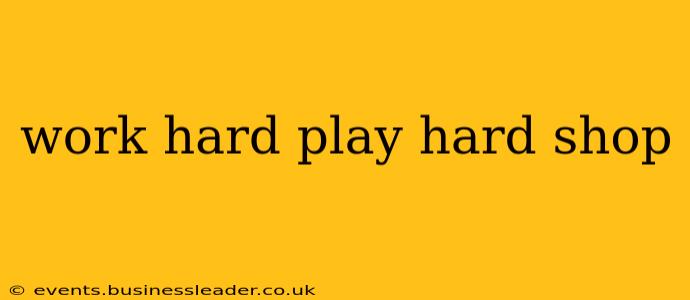The mantra "work hard, play hard" has become a ubiquitous expression in modern society, reflecting the ambition to achieve professional success while also prioritizing leisure and enjoyment. But what about shopping? For many, shopping isn't simply a necessity; it's a form of relaxation, self-expression, and even a reward for hard work. This article explores the dynamic interplay between work, leisure, and shopping, providing insights into how to find a healthy balance and avoid the potential pitfalls of an over-consumption mindset.
What Does "Work Hard, Play Hard, Shop" Really Mean?
The phrase encapsulates a lifestyle where dedication to professional goals is coupled with an equally strong emphasis on personal fulfillment. "Work hard" speaks to ambition, discipline, and a commitment to excellence in one's career. "Play hard" highlights the importance of rest, recreation, and engaging in activities that bring joy and rejuvenation. Adding "shop" to the equation acknowledges the role that consumerism plays in many people's lives, whether as a stress reliever, a form of self-care, or simply a way to enjoy the fruits of their labor.
How Can I Balance Work, Play, and Shopping?
Achieving balance requires mindful planning and self-awareness. It's about establishing clear boundaries and prioritizing activities that contribute to overall well-being.
Setting a Realistic Budget:
This is crucial. Before you indulge in any shopping spree, create a detailed budget that allocates funds for necessities, savings, leisure activities, and – importantly – shopping. Stick to it! This prevents impulsive purchases and promotes financial stability. Track your spending to understand where your money goes and identify areas where you can cut back.
Prioritizing Experiences over Material Possessions:
While shopping can be enjoyable, remember that experiences often create more lasting happiness than material goods. Investing in travel, concerts, hobbies, or social gatherings can provide more fulfilling memories than another item in your closet.
Mindful Shopping:
Instead of impulsive purchases, engage in mindful shopping. Ask yourself: Do I really need this? Will this purchase add value to my life? Can I afford this without jeopardizing my financial stability? Waiting 24 hours before making a non-essential purchase can often help prevent regrettable decisions.
Rewarding Yourself Appropriately:
Shopping can be a great reward after achieving a professional goal or completing a challenging task. However, the reward should be proportionate to the effort. A small, carefully considered purchase is far more satisfying than excessive spending that leads to debt and regret.
Is it Okay to Shop as a Reward for Hard Work?
Absolutely! Shopping can be a perfectly acceptable reward, provided it's done responsibly and within your budget. The key is to avoid using shopping as a coping mechanism for stress or unhappiness. A carefully chosen item that brings genuine joy and aligns with your style is a far better reward than accumulating items you don't truly need or want.
How Can I Avoid Overspending When I Shop?
Overspending is a common pitfall, particularly when using shopping as a reward. Here are some strategies:
- Set a spending limit before you start shopping.
- Unsubscribe from tempting marketing emails.
- Leave your credit cards at home and only take cash.
- Shop with a friend who can help you stay accountable.
- Prioritize quality over quantity. Investing in fewer, higher-quality items can be more sustainable and satisfying in the long run.
How to Find Joy in the Simple Things, Reducing Reliance on Shopping for Happiness?
Cultivating inner peace and contentment is key to reducing dependence on external sources of happiness, such as shopping. Engage in activities like mindfulness meditation, spending time in nature, connecting with loved ones, and pursuing hobbies. These activities can provide a more sustainable and profound sense of joy than any material purchase.
By adopting a balanced approach to work, play, and shopping, you can create a fulfilling and sustainable lifestyle that prioritizes both professional success and personal well-being. Remember, the key is moderation, mindful spending, and focusing on experiences that enrich your life, rather than solely relying on material possessions for happiness.
